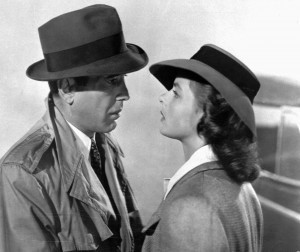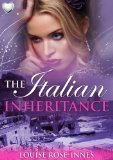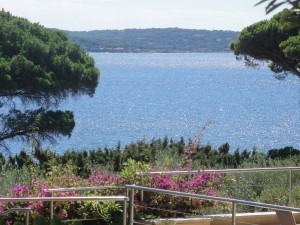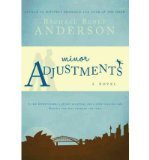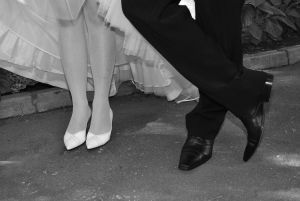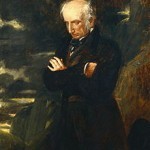Hannah Fielding's Blog, page 132
April 15, 2013
The romance of French cuisine
 French is known as the language of love, and the French are popularly characterised as romantic, passionate people. And when it comes to cuisine, of course the French are internationally acclaimed for their gastronomy – the rich flavours, the fresh ingredients, the commitment to excellence, the Mediterranean influence creeping in from neighbouring Italy and Spain, the sublime heritage of both the haute cuisine and the bourgeois and peasant cuisines of the French countryside.
French is known as the language of love, and the French are popularly characterised as romantic, passionate people. And when it comes to cuisine, of course the French are internationally acclaimed for their gastronomy – the rich flavours, the fresh ingredients, the commitment to excellence, the Mediterranean influence creeping in from neighbouring Italy and Spain, the sublime heritage of both the haute cuisine and the bourgeois and peasant cuisines of the French countryside.
I live for part of the year in the south of France, and I revel in the food while I am there. The local markets are crammed with exquisite local produce – cheeses, wines, eggs, fruits, vegetables, breads, seafood – which, along with the herbs from my garden, form the basis for all my cooking and for picnics in the summer months. I’ve travelled to many places in my life, and I can honestly say that nowhere beyond France have I tasted such ripe, juicy, flavoursome tomatoes, which form the basis for many dishes.
Eating out is also a delight. The choice of eateries is vast, from established restaurants serving the very best (and most expensive) dishes, down to little pavement cafes tucked away in hilltop and coastal villages, where even a simple salad or croque monsieur (the French version of a cheese toastie) is delightful.
But it is not just the food itself that appeals in France: it is the French customs that surround dining. Food matters in France. Eating together with loved ones is an integral part of the day. We sit together for meals, and we eat at a leisurely pace – we don’t grab sandwiches and eat them on the go; we take our time making and sharing meals. Dining on our terrace in France overlooking views of the sparkling sea is one of life’s greatest pleasures, and it is very romantic.
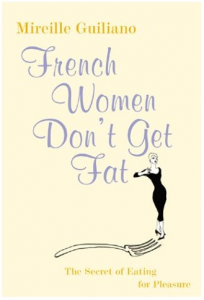 If you are inspired by the French approach to dining, I heartily recommend the books of Mireille Guiliano. She is an internationally bestselling French author who was once CEO of Clicquot (the Champagne manufacturer), and she is now what French newspaper Le Figaro calls “an ambassador of France and its art of living”. Her book French Women Don’t Get Fat: The Secret of Eating for Pleasure beautifully conveys the French approach to eating: eating the most wonderful foods in moderation. Who could fail to adore a book that promotes bread, Champagne, chocolate and romance as key ingredients to a balanced diet and lifestyle? This is the ‘diet’ book to end all diet books, and the recipes within are superb – decadent at first glance, and yet, when you read the book closely, you realise that they don’t have to be perceived as such.
If you are inspired by the French approach to dining, I heartily recommend the books of Mireille Guiliano. She is an internationally bestselling French author who was once CEO of Clicquot (the Champagne manufacturer), and she is now what French newspaper Le Figaro calls “an ambassador of France and its art of living”. Her book French Women Don’t Get Fat: The Secret of Eating for Pleasure beautifully conveys the French approach to eating: eating the most wonderful foods in moderation. Who could fail to adore a book that promotes bread, Champagne, chocolate and romance as key ingredients to a balanced diet and lifestyle? This is the ‘diet’ book to end all diet books, and the recipes within are superb – decadent at first glance, and yet, when you read the book closely, you realise that they don’t have to be perceived as such.
Now all this talk of French cuisine has made my hungry, so I’ll sign off now in search of a pain au chocolat and a café au lait…
April 14, 2013
25 of the most romantic lines from movies
When I was a teenager, my Saturday afternoon trip to the cinema was the highlight of my week. I would go with my father and my sister, and we’d watch the latest Hollywood spectacular. I loved being swept away in the great romances playing out on screen. Those first films I watched were fodder for my fertile imagination, and still, when I watch the movies of my teens now, I lose myself in the wonderfully passionate, epic love stories.
These days, I don’t visit the cinema often, but I still love to curl up and watch a movie on the television. Books, of course, are my number one choice for romantic escapism, but movies come a close second, because the staging and the characterisation and the settings and the music – everything adds up to such a powerful, cathartic experience.
This week, I’ve been collating some of my favourite romantic movie lines. I’m sharing 25 of my favourites here, and Tweeting them through the week as well. Enjoy!
You stay alive, no matter what occurs!… No matter how long it takes, no matter how far, I will find you. Last of the Mohicans
It was a million tiny little things that, when you added them all up, they meant we were supposed to be together … and I knew it. I knew it the very first time I touched her. It was like coming home. .. only to no home I’d ever known … I was just taking her hand to help her out of a car and I knew. It was like … magic. Sleepless in Seattle
It seems right now that all I’ve ever done in my life is making my way here to you. The Bridges of Madison County
If there’s any kind of magic in this world, it must be in the attempt of understanding someone, sharing something. Before Sunrise
Sometimes there’s so much beauty in the world I feel like I can’t take it, like my heart’s going to cave in. American Beauty
I would rather have had one breath of her hair, one kiss from her mouth, one touch of her hand, than eternity without it. City of Angels
I love that you get cold when it’s 71 degrees out. I love that it takes you an hour and a half to order a sandwich. I love that you get a little crinkle in your nose when you’re looking at me like I’m nuts. I love that after I spend day with you, I can still smell your perfume on my clothes. And I love that you are the last person I want to talk to before I go to sleep at night. And it’s not because I’m lonely, and it’s not because it’s New Year’s Eve. I came here tonight because when you realize you want to spend the rest of your life with somebody, you want the rest of your life to start as soon as possible. When Harry Met Sally
No, I don’t think I will kiss you, although you need kissing, badly. That’s what’s wrong with you. You should be kissed and often, and by someone who knows how. Gone With the Wind
Kiss me. Kiss me as if it were the last time. Casablanca
You made me a man by loving me, Holly. And for that, I am eternally grateful… literally. If you can promise me anything, promise me that whenever you’re sad, or unsure, or you lose complete faith, that you’ll try to see yourself through my eyes. Thank you for the honor of being my wife. I’m a man with no regrets. How lucky am I? You made my life, Holly. But I’m just one chapter in yours. There’ll be more. I promise. So here it comes, the big one. Don’t be afraid to fall in love again. Watch out for that signal, when life as you know it ends. P.S. I will always love you. PS I Love You
Me? I’m scared of everything. I’m scared of what I saw, I’m scared of what I did, of who I am, and most of all I’m scared of walking out of this room and never feeling the rest of my whole life the way I feel when I’m with you. Dirty Dancing
The greatest thing you’ll ever learn is just to love and be loved in return. Moulin Rouge
Longing. Longing for a wave of love that would stir in me. That’s what makes me clumsy. The absence of pleasure. Desire for love. Desire to love. Wings of Desire
14. You make me want to be a better man. As Good As It Gets
I promise I’ll come back for you. I promise I’ll never leave you. The English Patient
I love you. I’ve loved you since the first moment I saw you. I guess maybe I’ve even loved you before I saw you. A Place in the Sun
Don’t forget I’m just a girl, standing in front of a boy, asking him to love her. Notting Hill
You have bewitched me, body and soul, and I love you. I never wish to be parted from you from this day on. Pride and Prejudice
You had me at hello. Jerry Maguire
I vow no matter what challenges might carry us apart that we will always find a way back to each other. The Vow
There are only four questions of value in life: What is sacred? Of what is the spirit made? What is worth living for? And what is worth dying for? The answer to each is the same. Only love. Don Juan De Marco
So it’s not gonna be easy. It’s gonna be really hard. We’re gonna have to work at this every day, but I want to do that because I want you. I want all of you, for ever, you and me, every day. Will you do something for me, please? Just picture your life for me? 30 years from now, 40 years from now? What’s it look like? If it’s with him, go. Go! I lost you once, I think I can do it again. If I thought that’s what you really wanted. But don’t you take the easy way out. The Notebook
Ehm, look. Sorry, sorry. I just, ehm, well, this is a very stupid question and… particularly in view of our recent shopping excursion, but I just wondered, by any chance, ehm, eh, I mean obviously not because I guess I’ve only slept with 9 people, but-but I-I just wondered… ehh. I really feel, ehh, in short, to recap it slightly in a clearer version, eh, the words of David Cassidy in fact, eh, while he was still with the Partridge family, eh, “I think I love you,” and eh, I… I just wondered by any chance you wouldn’t like to… Eh… Eh… No, no, no of course not… I’m an idiot, he’s not… Excellent, excellent, fantastic, eh, I was gonna say lovely to see you, sorry to disturb… Better get on… Four Weddings and a Funeral
Listen to me, mister. You’re my knight in shining armor. Don’t forget it. On Golden Pond
Winning that ticket, Rose, was the best thing that ever happened to me… it brought me to you … You must do me this honor, Rose. Promise me you’ll survive. That you won’t give up, no matter what happens, no matter how hopeless. Promise me now, Rose, and never let go of that promise. Titanic
So there you have them – 25 of the seminal lines in movies that make me melt. Which lines would you add to the list?
In addition, if you love romance movies, take a look at this news item: ‘Watch Love Actually to heal a broken heart and Mamma Mia to end a midlife crisis: New movie timeline chronicles our lives in film’. A survey by Universal Pictures has found that the film most likely to inspire a person to find love is Love Actually, and that the ‘biggest celebrity crush moment for women’ is Colin Firth as Mr Darcy in Pride and Prejudice – no surprise there!
April 12, 2013
Book review: The Italian Inheritance by Louise Rose-Innes
From the blurb:
After discovering a letter written by her mother shortly before her death, Anna Crawford, a London-based nurse, decides to travel to the Italian island of Capri in search of her father. What she doesn’t expect to find is that she’s heir to a vast family fortune. She’s even more surprised when the suspicious trust attorney questions her very identity.
Rafael Vialli has a suspicious nature – it’s the reason he became a lawyer. He blames his rough childhood. It may also have something to do with the fact that in the months since Giovanni Albertosi’s death, he’s been inundated with opportunistic women claiming to be his client’s missing heir.
Can Anna prove to Rafael that she really is the legitimate heir? And can Rafael trust enough to award her the inheritance… as well as his heart?
The book is set on the beautiful Italian island of Capri, and the author’s delightful descriptions of the island really transport you to this wonderful setting for this love story:
So far Anna loved everything about Capri. The smells were sweet and pungent, the heat balmy and all-encompassing. She’d never seen sky so blue and peering into the azure depths of the Mediterranean as the ferry docked, Anna was overwhelmed by its shimmering clarity. She could even make out the sandy bottom, which had her fighting the urge to throw her hot, sweaty self overboard and into the inviting depths. Capri was a far cry from the austere greyness of London and Anna felt like she had landed on another planet.
There are two main characters in this book, and the story is told from both their perspectives. Both are highly attractive – Rafael, the sexy, deep-voiced Italian, perfectly chiselled with a slightly rough exterior, who oozes confidence; and Anna, the tall, blond, model-like nurse from London, who is looking for a man to settle down with and start a family. Not necessarily two people you would expect to make a good love match. But Anna has not come to Capri looking for love; she is looking for the man she believes to be her father – only she has to get past Rafael first.
The chemistry between these two characters is instantaneous and fiery. Neither can help themselves. But what is confusing for Anna is that Rafael is definitely not looking for anything long term. In fact, he does not even believe that happy-ever-after exists:
Rafael shrugged. “That’s life. Who said it was fair?”
“It sucks. Have you ever loved someone who didn’t love you back?”
He glanced at her curiously. “No,” he said honestly. “I’m not sure I believe in love. Lust, definitely, but that fades with time. Loyalty, yes, for someone you respect. But love…” He shook his head.
The book explores the feelings of these two characters as they deal with tests of their own beliefs about love and lust. It is steamy and passionate at times, and you find yourself willing them on to just be honest with each other.
I really enjoyed the author’s writing style, which is descriptive yet light, and at times even funny:
What the hell am I doing? The man is sex on toast and I’m refusing to take a bite. I must need my head read.
It is easy to engage with these characters, despite both their sex-god(dess) appearances. Their thoughts and feelings are clear and compelling. The unforeseen twist towards the end proves that the plot is not predictable, but the essential happy ending is there, true to genre.
In all, a fabulous story and a beautiful island that I cannot wait to visit.
The Italian Inheritance is available now from Amazon; click on the book cover below to visit the store.
April 11, 2013
Longing for summer…
April 9, 2013
Romantic recipe: Chocolate fondue
Fondue is inherently romantic, calling for candlelight and sharing food from the same dish and nibbling delicate amounts and feeding your partner. Traditionally, fondue is a dish from Switzerland, France and Italy in which you dip breads into cheese that is kept warm and melted over a small portable stove. But in recent years, a new, delicious and sublimely romantic twist to the dish has become popular: chocolate fondue. What better way to use up all that Easter chocolate?
You’ll need a fondue pot, to ensure the chocolate remains at melting point, and skewers for the foods you dip in. Other than that, the equipment needs are basic, and your focus is all on the food!
The chocolate:
The richer and more expensive, the better! I add in a good dash of heavy cream to the mix as well to lighten it up. You can also melt in coconut, honey, caramel, marshmallow, cinnamon, chilli, vanilla extract, orange zest, coffee and/or liqueurs.
The dippers:
Try these:
Banana chunks (frozen work well)
Biscotti
Bread and cake (a little stale works best)
Doughnut balls
Dried apricots
Fresh pineapple chunks
Frozen cheesecake cut into cubes
Marshmallows
Meringues
Orange segments
Pear quarters
Peppermint creams
Popcorn
Pretzels
Slices of waffle
Strawberries
Truffles
Don’t forget to follow the tradition for fondues: if a man loses his dipper in the pot, he buys drinks all around, and if a woman does, she must kiss her neighbour. What a wonderful excuse, ladies, to ‘lose’ a bit of fruit…
April 7, 2013
Flash mobs: Crossing the boundaries into the arts
I love flash mobs, because they are surprising and theatrical and romantic and the very embodiment of the French phrase joie de vivre. Since their inception in 2003 (the first was in Manhattan, organised by the editor of Harper’s Magazine as a social experiment), flash mobs have crept into the public consciousness to the degree that if you are out on the street in a big city and rapidly increasing numbers of people start to do something strange around you, you quickly realise that you’re watching a flash mob.
So a YouTube search for ‘flash mob’ and you find thousands of videos of spontaneous, joyous, non-conformist events. Some of my favourites are those that have been organised by a hopeful suitor who drops to one knee at the end and asks his love to marry him. Here’s a beautiful one: a man who arranged three hundred people to give his girlfriend a flower each, and then appeared in a tuxedo to propose – ah, romance!
But a new trend in flash mobs is pushing through that’s really exciting: creating a new way to express the arts and bring them to the public’s attention. For example, in autumn last year Lafeyette College in the States played host to a literary flash mob for Banned Books Week in which participants read aloud from 30 books that have been banned in America’s history. Not a beautiful sound by any means, but powerful.
Then recently, to mark the reopening of Amsterdam’s wonderful Rijksmuseum, actors re-created the museum’s most famous work, Rembrandt’s masterpiece ‘The Night Watch’.
Of course, you also have wonderful musical flash mobs bringing new life to classical music, such as the following unexpected performance of Handel’s Hallelujah Chorus in a shopping centre food court:
What do you think? Would you love to stumble upon such a flash mob – or perhaps even take part? Do you think art belongs in a museum, or out on the streets, intermingled with everyday life? I would love to hear your thoughts.
April 5, 2013
Book review: Minor Adjustments by Rachael Renee Anderson
From the blurb:
Chicago businessman and bachelor Devon Pierce is completely unprepared to be the guardian of Australian four-year-old Ryan Caldwell. But Ryan’s solicitor, Stella Walker, won’t take no for an answer. Little does Devon know this “minor” adjustment will grant him a future he never expected to have. Told in a fast-paced, poignant, and witty style, Minor Adjustments will take you on a journey of humor, growth, romance, and love.
When workaholic businessman Devon Pierce arrives in Australia to meet the solicitor of former acquaintance Lindsay Caldwell, little does he know that his life is about to change. Handsome and kind, Devon’s life revolves around his work; in eight years he has not taken a day off from the successful business that he founded himself. Indeed, his company is an obsession that has driven away his fiancée, limited his friends, and kept him separated from his large and loving family. Yet a meeting with beautiful Australian solicitor Stella Walker is about to present him with a new challenge: to become legal guardian to Lindsay’s child, Ryan.
Ryan. His buddy, his champ. The boy who’d traipsed into Devon’s life with his dimple, his charm, and his little Australian accent. The boy who giggled, loved Aussie, tracked dirt everywhere, coloured on walls, memorized poems, and made castles for ninjas. The boy who sent balloons to heaven and couldn’t understand why the Southern Cross didn’t appear in the Portland night skies. The boy who called him Dad.
At its heart this well-paced book is a very sweet, very simple love story. But unlike most romance novels, this story revolves around the mutual love of three main characters, Devon, Ryan and Stella, as they develop a relationship that spans the world. Indeed the overarching theme of the book is about love in all its many guises, the tragic friendship of Stella and Lindsay, the long-distance romance between Devon and Stella (Will they? Won’t they?), the love of a family accepting a lost member back into its fold, the bittersweet decision to exchange an old, safe life for something unknown, the deep parental desire to do what’s best for a child. However, through Lindsay’s story the book also touches on the effects of withholding love and affection, how uncaring parents can scar a child for life and how even a short experience of true family warmth can act as a beacon of perfection decades later.
Told from the adults’ points of view, we experience what it is like to be Devon, torn between the job he loves and the child he must care for. We get to experience Stella, lonely, frosty, unhappy with her friend’s decision, forced to trust a man she doesn’t know with a child she loves. We get to feel the wonder of exploring the Australian landscape: the bustle and landmarks of Sydney, the stunning beaches, the wild beauty of the outback and the Blue Mountains in particular. We get to live vicariously through Devon as he falls in love with Australian culture, wildlife (but not pet goldfish) and food (but definitely not Vegemite) and, of course, Stella. We watch the characters as they grow, playful Devon embracing his kind, caring, paternal nature as he learns to be a parent, and the wise-cracking, fact-loving Stella as she comes to realise that her friend Lindsay knew what she was doing after all.
The book is not all sweetness, however; there are villains and threats, most particularly in the guise of the wicked and abusive Justin Wells, the one man who can destroy their new-found perfection. Of course, it is no spoiler to say that love conquers all in the end (after all, what would this book be without a happy ending?), but so great has our affection for the family grown that we are genuinely relieved when things work out the way they do – a clear testament to Rachael Renee Anderson’s warm-hearted writing style.
A wholehearted recommendation from me for an uplifting book.
Minor Adjustments is available now from Amazon; click on the book cover below to visit the store.
April 3, 2013
Cuisine d’été
 Literally translated, cuisine d’été means ‘summer kitchen’. Eating outside is all part of the French way of life, but in the summer the lawn can become intensely hot, so we have breakfast and lunch here, in the shade.
Literally translated, cuisine d’été means ‘summer kitchen’. Eating outside is all part of the French way of life, but in the summer the lawn can become intensely hot, so we have breakfast and lunch here, in the shade.
April 1, 2013
Romantics unite: Be out and proud!
Romantic:
Adjective: Inclined toward or suggestive of the feeling of excitement and mystery associated with love.
Noun: A person with romantic beliefs or attitudes.
I have always thought of myself as romantic. From such a tender age I loved to hear my governess tell love stories, and to dream up my own. But then I grew up, and I discovered that this wonderful, comforting, happy part of me wasn’t necessarily something valued by society.
Consider, for a moment:
You admit to, or confess to, being a romantic.
You’re soppy.
You’re slushy.
You’re sentimental.
You’re a hopeless romantic.
Why does each of these sentences have negative connotations? Why do many, from mid-childhood onwards, tease others for being dreamy and romantic? Why is believing in love and passion seen as a weakness, something to be embarrassed about and ‘admit to’ sheepishly? Why are you a ‘hopeless’ romantic – surely that’s an oxymoron; the very foundation of romance is hope?
Earlier this week, I wrote about the Romantic poets: Byron, Coleridge, Blake, Wordsworth, Keats, Shelley. There was nothing ashamed in their poetry. Romance radiates from every word.
Why do we shun such romanticism today? Why is reality television more popular than the epic love stories of the past? Why aren’t we all reading romance novels and then attempting to make fact of fiction: creating the kind of heart-warming romantic moments we love to read about in reality, every day?
The answers, I suppose, lie deep within myriad societal issues. But that’s not to say we can’t make a change.
So the next time someone asks you what you’re going to see at the cinema, why not say confidently, ‘That new romance.’ And the next time someone asks you what you’re reading, say with your head held high, ‘A steamy, passionate, evocative romance novel.’ And the next time someone asks you about yourself, tell them with pride, ‘I’m a really romantic person.’
March 30, 2013
The Romantics: Six poets who changed the world
Changed the world? Yes, really. The Romantic movement of early-nineteenth-century England created a new way of writing, and of perceiving the world. According to historian Peter Ackroyd, for example, Coleridge and Wordsworth were “truly the pioneers in what has since become the ‘back to nature’ movement. Anyone who yearns to walk beside the sea, or to ascend a mountain, or to row across a lake, owes a great debt to these two English poets.” The poets of this movement were dreamers: lyrical, spiritual, anchored to nature, sublimely romantic. No wonder, then, that their poems are among my favourites.
Today, I’m sharing just a little about six of the best known Romantic poets, and a favourite verse from each.
William Blake (8 November 1757 – 12 August 1827) Three interesting facts:
Three interesting facts:
He was a professional engraver.
He painted, and studied at the Royal Academy.
He was commissioned to produce artworks for Dante’s Divine Comedy.
Extract, from ‘The Clod and the Pebble’:
Love seeketh not Itself to please,
Nor for itself hath any care;
But for another gives its ease,
And builds a Heaven in Hell’s despair.
William Wordsworth (7 April 1770 – 23 April 1850)
He was born in the Lake District, attended university in Cambridge, and travelled extensively in France, Switzerland and Italy.
He was very close to his sister, Dorothy, who was also a poet.
He was the British Poet Laureate from 1843 until his death. He was the only laureate to write no official poetry during his tenure.
Extract, from ‘She Was a Phantom of Delight’:
She was a Phantom of delight
When first she gleam’d upon my sight;
A lovely Apparition, sent
To be a moment’s ornament:
Her eyes as stars of twilight fair;
Like twilight’s, too, her dusky hair;
But all things else about her drawn
From May-time and the cheerful dawn;
A dancing shape, an image gay,
To haunt, to startle, and waylay.
Samuel Taylor Coleridge (21 October 1772 – 25 July 1834)
He was the youngest of ten children.
Coleridge and Wordsworth were friends, and they published a volume of poetry together called Lyrical Ballads, which launched the English Romantic movement.
Coleridge’s The Rime of the Ancient Mariner was an inspiration for Mary Shelley in Frankenstein.
Extract, from ‘What If You Slept’:
What if you slept
And what if
In your sleep
You dreamed
And what if
In your dream
You went to heaven
And there plucked a strange and beautiful flower
And what if
When you awoke
You had that flower in your hand
Ah, what then?
 George Gordon, Lord Byron (22 January 1788 – 19 April 1824)
George Gordon, Lord Byron (22 January 1788 – 19 April 1824)
Three interesting facts:
He had club foot, and walked with a limp, which made him miserable.
He had several affairs with married women.
He fought against the Ottoman Empire in the Greek War of Independence, and became a national treasure to the Greeks for his heroics.
Extract, from ‘She Walks in Beauty’:
She walks in beauty, like the night
Of cloudless climes and starry skies;
And all that’s best of dark and bright
Meet in her aspect and her eyes…
Percy Bysshe Shelley (4 August 1792 – 8 July 1822)
He was expelled from Oxford University for being radical.
His second wife was Mary Shelley, author of Frankenstein.
He drowned in a sudden storm, and his graves bears an inscription from Shakespeare’s The Tempest: ‘Nothing of him that doth fade / But doth suffer a sea-change / Into something rich and strange.’
Extract, from ‘Love’s Philosophy’:
See the mountains kiss high heaven,
And the waves clasp one another;
No sister-flower would be forgiven
If it disdain’d its brother;
And the sunlight clasps the earth,
And the moonbeams kiss the sea—
What are all these kissings worth,
If thou kiss not me?
John Keats (31 October 1795 – 23 February 1821)
He studied medicine at Guy’s Hospital, London.
He was in love with a lady named Fanny Brawne, but their love was never consummated.
He died aged twenty-five, just four years after first being published.
Extract, from ‘To Autumn’:
Season of mists and mellow fruitfulness
Close bosom-friend of the maturing sun
Conspiring with him how to load and bless
With fruit the vines that round the thatch-eaves run;
To bend with apples the moss’d cottage-trees,
And fill all fruit with ripeness to the core;
To swell the gourd, and plump the hazel shells
With a sweet kernel; to set budding more,
And still more, later flowers for the bees,
Until they think warm days will never cease,
For Summer has o’er-brimm’d their clammy cells.


